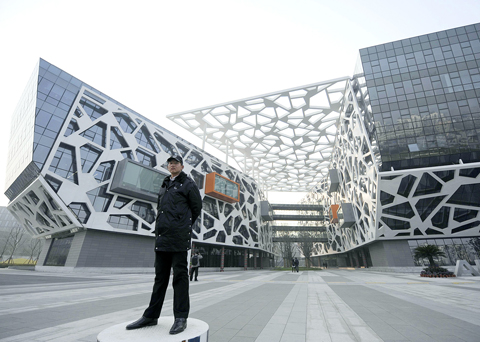China’s e-commerce giant Alibaba (阿里巴巴) yesterday condemned as “reckless” its partner Yahoo’s support of Google, which has threatened to pull out of the Asian nation over censorship and cyber attacks.
“Alibaba Group has communicated to Yahoo that Yahoo’s statement that it is ‘aligned’ with the position Google took last week was reckless given the lack of facts in evidence,” the firm’s spokesman John Spelich said in an e-mail.
“Alibaba doesn’t share this view,” he said.

PHOTO: REUTERS
Google announced on Tuesday that it would no longer censor search engine results in China and possibly leave the world’s largest online market, complaining about cyber attacks and censorship by the Chinese Communist Party regime.
China-based cyber spies struck the Internet giant and reportedly more than 30 other firms in an apparent bid for computer source codes, intellectual property and information about human rights activists around the world.
A spokeswoman for Yahoo, which owns 39 percent of Alibaba, on Wednesday welcomed Google’s decision.
“Yahoo is committed to protecting human rights and takes our users’ privacy and security very seriously,” the spokeswoman said.
“We condemn any attempts to infiltrate company networks to obtain user information,” he said.
“We stand aligned with Google that these kinds of attacks are deeply disturbing and strongly believe that the violation of user privacy is something that we as Internet pioneers must all oppose,” she said.
Alibaba controls Yahoo’s operations in China and also runs the nation’s top online auction site Taobao.com and business-to-business e-commerce platform Alibaba.com.
Chinese authorities regularly block content and Web sites they deem politically objectionable in a vast censorship system in a country with over 380 million online users.
Social networking site Facebook, Google’s video-sharing system YouTube and micro-blogging Web site Twitter are also blocked.

Seventy percent of middle and elementary schools now conduct English classes entirely in English, the Ministry of Education said, as it encourages schools nationwide to adopt this practice Minister of Education (MOE) Cheng Ying-yao (鄭英耀) is scheduled to present a report on the government’s bilingual education policy to the Legislative Yuan’s Education and Culture Committee today. The report would outline strategies aimed at expanding access to education, reducing regional disparities and improving talent cultivation. Implementation of bilingual education policies has varied across local governments, occasionally drawing public criticism. For example, some schools have required teachers of non-English subjects to pass English proficiency

‘FORM OF PROTEST’: The German Institute Taipei said it was ‘shocked’ to see Nazi symbolism used in connection with political aims as it condemned the incident Sung Chien-liang (宋建樑), who led efforts to recall Democratic Progressive Party (DPP) Legislator Lee Kun-cheng (李坤城), was released on bail of NT$80,000 yesterday amid an outcry over a Nazi armband he wore to questioning the night before. Sung arrived at the New Taipei City District Prosecutors’ Office for questioning in a recall petition forgery case on Tuesday night wearing a red armband bearing a swastika, carrying a copy of Adolf Hitler’s Mein Kampf and giving a Nazi salute. Sung left the building at 1:15am without the armband and apparently covering the book with a coat. This is a serious international scandal and Chinese

TRADE: The premier pledged safeguards on ‘Made in Taiwan’ labeling, anti-dumping measures and stricter export controls to strengthen its position in trade talks Products labeled “made in Taiwan” must be genuinely made in Taiwan, Premier Cho Jung-tai (卓榮泰) said yesterday, vowing to enforce strict safeguards against “origin laundering” and initiate anti-dumping investigations to prevent China dumping its products in Taiwan. Cho made the remarks in a discussion session with representatives from industries in Kaohsiung. In response to the US government’s recent announcement of “reciprocal” tariffs on its trading partners, President William Lai (賴清德) and Cho last week began a series of consultations with industry leaders nationwide to gather feedback and address concerns. Taiwanese and US officials held a videoconference on Friday evening to discuss the

PERSONAL DATA: The implicated KMT members allegedly compiled their petitions by copying names from party lists without the consent of the people concerned Judicial authorities searched six locations yesterday and questioned six people, including one elderly Chinese Nationalist Party (KMT) member and five KMT Youth League associates, about alleged signature forgery and fraud relating to their recall efforts against two Democratic Progressive Party (DPP) legislators. After launching a probe into alleged signature forgery and related fraud in the KMT’s recall effort, prosecutors received a number of complaints, including about one petition that had 1,748 signatures of voters whose family members said they had already passed away, and also voters who said they did not approve the use of their name, Taipei Deputy Chief Prosecutor